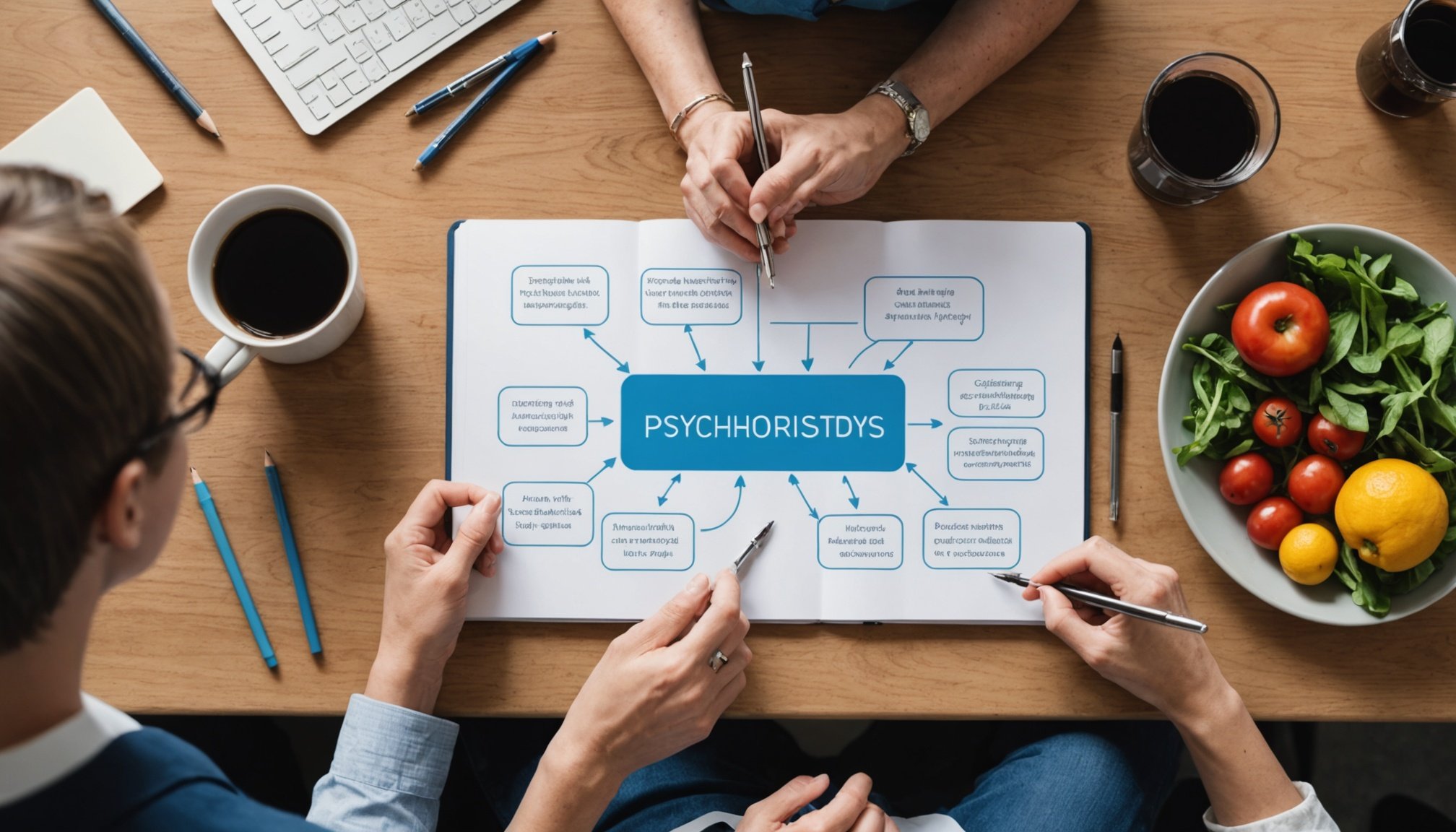Overview of Eating Disorders in the UK
In recent years, the prevalence of eating disorders in the UK has noticeably increased, presenting a significant challenge for healthcare providers and clinical psychologists alike. According to UK statistics, approximately 1.25 million people are affected by an eating disorder, with varying degrees of severity and impact on daily life. This rise signals a concerning trend that requires immediate attention.
Demographic factors play a crucial role in the development of eating disorders. While historically more common among young women, clinical psychologists have noted a rise in cases among men, as well as those in older age groups. Additionally, socio-economic background, ethnicity, and gender can also influence the prevalence and type of eating disorder experienced.
Also read : Effective Approaches for UK Mental Health Counselors Addressing Dual Diagnosis Challenges
Understanding the cultural context is pivotal in the effective treatment of eating disorders. Clinical psychologists emphasize that cultural norms and societal pressures, especially those related to body image, often shape how individuals perceive and deal with their conditions. Tailoring treatments to consider these factors can lead to more successful outcomes for patients.
It is crucial to foster awareness and dialogue around eating disorders, utilizing UK statistics effectively to inform policies and treatment approaches. This understanding, combined with professional guidance from clinical psychologists, is vital to addressing this pressing issue comprehensively.
Additional reading : Unlock your potential: expert psychotherapist in london
Evidence-Based Frameworks for Intervention
In the realm of addressing eating disorders, evidence-based practice holds a pivotal role. It is supported by rigorous research and clinical guidelines that shape efficient intervention strategies. These frameworks rely on a combination of tested methodologies and adaptable techniques, aimed at achieving optimal outcomes for patients.
At the heart of these interventions are clinical guidelines, which serve as a comprehensive guide for healthcare providers. These guidelines are crafted based on extensive studies and expert consensus, ensuring that intervention strategies are both effective and timely. They provide a solid foundation for structuring treatment plans, tailoring them to meet the diverse needs of individuals.
A critical component of implementing these intervention strategies is the use of specialized assessment tools. These tools aid in the nuanced evaluation of a patient’s unique circumstances, thereby informing the creation of personalized treatment plans. They ensure that interventions are not only precise but also adaptable to the evolving needs of each individual.
Successful implementation involves a well-rounded approach, including:
- Consistent reassessment to adjust treatment plans as necessary.
- Collaboration among interdisciplinary teams to integrate diverse expertise.
- Continuous updating of strategies in line with emerging research.
This comprehensive framework ensures that intervention strategies remain robust, ultimately fostering improved health outcomes.
Psychological Theories Relevant to Treatment
Understanding various psychological theories is essential in addressing eating disorders effectively. Among these, Cognitive Behavioral Therapy (CBT) stands out for its practicality and success rate. CBT focuses on altering negative thought patterns and behaviors that sustain the disorder. By identifying harmful cognitive distortions, CBT strives to replace them with more balanced concepts, guiding individuals towards healthier coping mechanisms.
Cognitive Behavioral Therapy and Its Effectiveness
CBT has proven particularly effective by targeting the root cognitive distortions that often underlie eating disorders. This therapy encourages patients to actively challenge and reformulate these beliefs. Studies have shown that CBT significantly reduces symptoms by empowering individuals to become more aware of their thought processes, thereby improving emotional regulation and promoting long-term recovery.
Family-Based Therapy as a Collaborative Intervention
Another powerful approach is Family-Based Therapy (FBT), especially useful for adolescents. FBT involves the family unit as a whole, supporting them to work together towards the patient’s recovery. This strategy ensures that family members provide consistent encouragement and understand their pivotal role in fostering a supportive environment. By actively engaging parents in the treatment process, FBT helps create a collaborative intervention that can accelerate recovery and strengthen family bonds.
Practical Tools and Techniques for Clinicians
When it comes to tackling the challenges of clinical practice, practical tools and intervention techniques can make a significant difference. These resources empower clinicians to design effective, individualized care plans that cater to each patient’s unique needs. Customizing treatment approaches is crucial as it acknowledges the individual’s circumstances and ensures that interventions are relevant and impactful.
By leveraging specific clinician resources, psychologists and therapists can enhance their intervention strategies. Useful tools include structured assessment forms, evidence-based intervention protocols, and apps developed for therapy tracking and management. These not only streamline the intervention process but also bolster the accuracy and consistency of treatment.
Effective interventions often rely on data and empirical research. Tools such as cognitive-behavioral therapy frameworks and motivational interviewing techniques equip clinicians with proven methods to facilitate patient progress. Moreover, access to digital libraries and peer collaboration platforms further extends the clinician’s toolbox, offering a wealth of shared knowledge and insights for effective intervention.
Incorporating these practical tools and techniques allows clinicians to deliver personalized care and adapt treatment to the evolving needs of the patient. Whether through direct patient interaction or ongoing professional development, having a repertoire of intervention techniques ensures clinicians’ capacity to offer high-quality care.
Case Studies and Success Stories
In analysing successful intervention case studies within the UK, it becomes clear that various elements contribute to favourable outcomes. One standout aspect is the role of multidisciplinary teams. A combined effort from specialists such as psychologists, therapists, and social workers significantly boosts treatment success. This collaborative approach ensures all facets of a patient’s needs are met, fostering a holistic healing process.
Several real-life examples demonstrate how adaptability in therapeutic approaches can lead to success. For instance, a treatment plan tailored to individual patient needs, which incorporates family involvement and regular progress reviews, shows substantial improvements. By continually assessing and adjusting strategies, therapy teams can address unforeseen challenges, leading to higher rates of recovery.
Lessons learned from these cases include the importance of communication and flexibility. Open forums between professionals encourage the exchange of insights, enhancing the quality of care provided. Moreover, empowering patients as active participants in their treatment rather than passive recipients also appears instrumental in achieving better outcomes.
These examples highlight that when treatment plans are customized to individual circumstances and backed by strong support networks, the likelihood of treatment success significantly increases. The shared efforts between versatile professionals and engaged patients pave the way for improved recovery experiences.
Multidisciplinary Collaboration in Treatment
Effective treatment of eating disorders hinges on a multidisciplinary team approach. This strategy underscores the value of bringing together diverse healthcare professionals, each contributing unique insights and expertise. Such collaboration ensures comprehensive, patient-centered care, which is vital in addressing the multifaceted challenges of eating disorders.
Importance of Collaboration
Collaboration among healthcare professionals leads to integrated care that considers all facets of a patient’s health. Dietitians, therapists, medical doctors, and mental health specialists work together to provide tailored care plans. This synchronized effort enhances treatment outcomes by ensuring consistency in care delivery and aligning therapeutic goals.
Strategies for Effective Communication
Clear and consistent communication is paramount to fostering effective collaboration within teams. Regular interdisciplinary meetings are crucial for discussing patient progress and challenges. Implementing shared digital platforms can facilitate seamless information exchange, keeping all team members informed and engaged.
Benefits of Integrated Care Models
Integrated care models offer numerous benefits when it comes to treating eating disorders. By combining the strengths of various specialties, these models address both the psychological and physiological aspects of eating disorders simultaneously. In doing so, they significantly improve recovery rates and reduce the risk of relapse. The holistic nature of integrated care ensures patients receive comprehensive support, ultimately facilitating sustainable recovery.
Recent Research and Developments
Recent research plays a crucial role in shaping the future of eating disorder treatment. An increasing number of studies are targeting more effective solutions to recognise and address these complex issues. Many current studies highlight emerging trends like digital intervention strategies, which are being progressively integrated into therapeutic contexts for more accessible support.
Clinical psychologists are now exploring these emerging trends in greater depth. They are finding that digital health tools and teletherapy can significantly enhance patient engagement and therapy outcomes, offering promising avenues for intervention. These innovative approaches not only provide cost-effective solutions to reach wider audiences but also ensure continuous support outside traditional clinical settings.
In recent years, innovative practices have taken center stage, with significant developments in therapy modalities. Cognitive-behavioral therapy (CBT) and mindfulness-based techniques are particularly highlighted as beneficial therapies for patients suffering from various forms of eating disorders. The integration of these therapies is being refined to tailor them more specifically towards individuals, leading to improved efficacy.
Such innovations not only focus on symptom management but also aim for a holistic approach to foster long-term well-being. As the field continues to evolve, adopting these emerging strategies may transform the landscape of eating disorder care, fostering a more supportive and effective treatment environment for patients.
Resources for Clinical Psychologists
Clinical psychologists have access to a wealth of clinical resources that can bolster their professional growth and enhance their practice. These resources include a variety of training opportunities specifically designed to address the evolving needs of the field. From workshops and seminars to online courses, these training programs provide psychologists with the skills needed to apply the latest interventions effectively.
Moreover, connecting with support networks—both locally and nationally—plays a crucial role. These networks facilitate sharing experiences and strategies, creating a collaborative environment where practitioners can learn from one another. Notably, national organizations often run forums and conferences, giving psychologists a platform to engage in meaningful discussions and gain insights into best practices.
The rise of online platforms has further transformed professional development. These platforms offer continuous learning opportunities in interventions, often through webinars and online journals. Such resources allow clinical psychologists to stay updated on the latest research and techniques, contributing to their training and professional proficiency.
To maximize the benefits, psychologists should actively participate in and contribute to these networks and platforms. By doing so, they can ensure they remain at the forefront of psychological practice, providing the best care for their clients.











